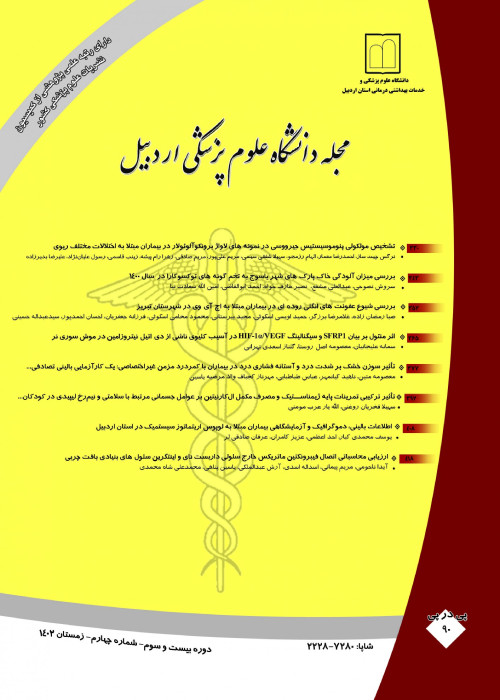A Comparison between Distilled Water and Manitole 3% during Transurethral Prostate Resection
Author(s):
Abstract:
Background and Objectives
Benign prostatic hyperplasia is one of the most common diseases in males and Transurethral Resection of Prostate (TUR-P) is a standard method for its surgery. Distilled water is used to clean the field of operation from blood and debris. The overabsorption of this washing fluid can lead to hemodynamic disorders and neurological complications called TUR-P syndrome. Because of hemolysis and ATN, most of the urologists, nowadays, prefer to use non-hemolytic solutions such as cytol and glycine 1.5%. Distilled water is widely used in Iran. Replacing this water with a nonhemolytic and hypoosmolar solution with reasonable price such as manitol 3% seems reasonable. This study was carried out to campare manitol 3% with distilled water during TUR-P. Methods
In a double-blind randomized clinical trial, we studied 78 patients with BPH who were admitted to Shahid Moddares hospital in Tehran for TUR-P. These patients were allocated to disstiled water group and manitol 3% group. Na, K, Cr, BUN, CBC, U/A, U/C, 24 hr urine volume and creatinine were checked preoperatively to determine GFR, Na, K, BUN and CBC were checked right after, 4 hours after and on the morning after the operation. Clinical signs of TUR-P syndrome were recorded in the patients as bradycardia, hypertension and neurologic sign. Results
Mean age was 68.6 in distilled water group and 66.4 in the manitol group. Mean weight of resected tissues, mean volume of the solution used and mean resection time were 19.8 gr, 19 litre, 50.8 minutes respectively in distilled water group and 20.2 gr, 20.3 litre and 51 minutes in the manitol 3% group. These differences were not statistically significant. The difference between decrease in serum Na and serum osmolality was not significant in two groups, however, hemolysis rate in two groups was statistically significant (p<0.01). The incidence rate of TUR-P syndrome was 34% in the distilled water group and 18% in manitol group. This difference was not statistically significant. Postoperative creatinine increase was 0.625 mg/dl in distilled water group and 0.04 mg/dl in manitol group. This was not statistically significant. Conclusion
Regarding the role of distilled water in hemolysis and ATN and due to the unavailability of non – hemolytic solutions such as glycine and cytol in Iran, the use of manitol 3% soluion which is a cost-effective, non hemolytic and hypoosmolar solution is recommended.Language:
Persian
Published:
Journal of Ardabil University of Medical Sciences, Volume:6 Issue: 19, 2006
Page:
14
magiran.com/p493510
دانلود و مطالعه متن این مقاله با یکی از روشهای زیر امکان پذیر است:
اشتراک شخصی
با عضویت و پرداخت آنلاین حق اشتراک یکساله به مبلغ 1,390,000ريال میتوانید 70 عنوان مطلب دانلود کنید!
اشتراک سازمانی
به کتابخانه دانشگاه یا محل کار خود پیشنهاد کنید تا اشتراک سازمانی این پایگاه را برای دسترسی نامحدود همه کاربران به متن مطالب تهیه نمایند!
توجه!
- حق عضویت دریافتی صرف حمایت از نشریات عضو و نگهداری، تکمیل و توسعه مگیران میشود.
- پرداخت حق اشتراک و دانلود مقالات اجازه بازنشر آن در سایر رسانههای چاپی و دیجیتال را به کاربر نمیدهد.
In order to view content subscription is required
Personal subscription
Subscribe magiran.com for 70 € euros via PayPal and download 70 articles during a year.
Organization subscription
Please contact us to subscribe your university or library for unlimited access!


